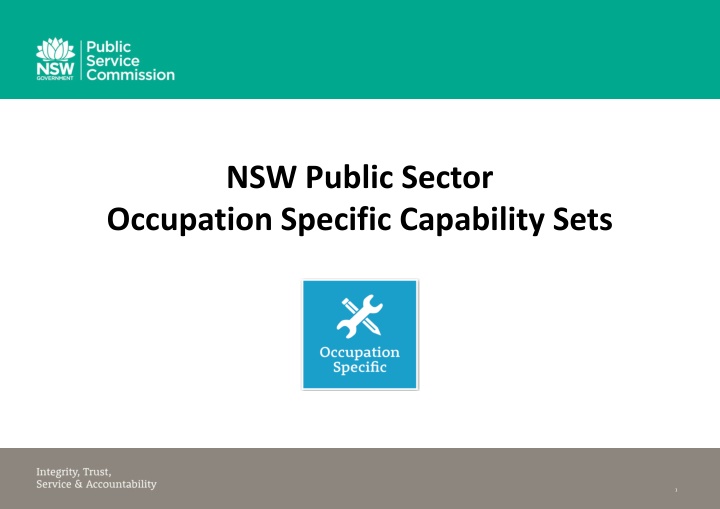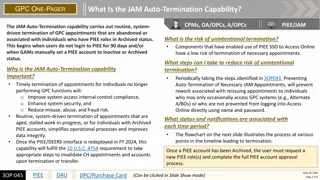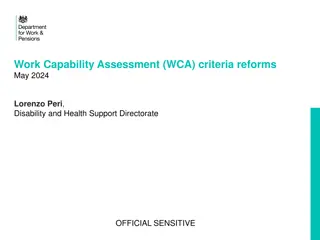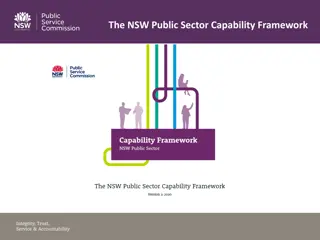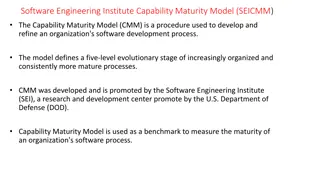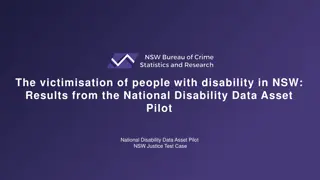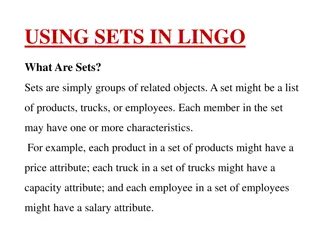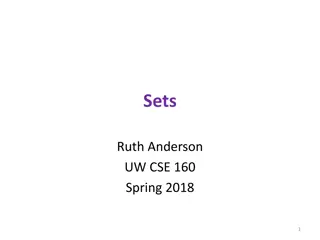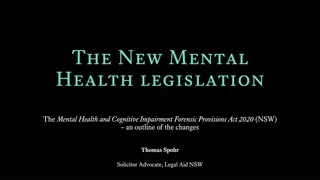NSW Public Sector Occupation Specific Capability Sets
NSW Public Sector Occupation Specific Capability Sets have been developed for specialist job families to provide a consistent description of unique capabilities required for roles in specific professions. They align with the NSW Public Sector Capability Framework to offer a comprehensive view of knowledge, skills, and abilities needed in these job families. Reasons for developing these sets include supporting workforce management activities and empowering employees in their professional development and career growth.
Download Presentation

Please find below an Image/Link to download the presentation.
The content on the website is provided AS IS for your information and personal use only. It may not be sold, licensed, or shared on other websites without obtaining consent from the author.If you encounter any issues during the download, it is possible that the publisher has removed the file from their server.
You are allowed to download the files provided on this website for personal or commercial use, subject to the condition that they are used lawfully. All files are the property of their respective owners.
The content on the website is provided AS IS for your information and personal use only. It may not be sold, licensed, or shared on other websites without obtaining consent from the author.
E N D
Presentation Transcript
NSW Public Sector Occupation Specific Capability Sets 1
What are occupation specific capability (OSC) sets? Occupational specific capability sets (OSCS) have been developed for specialist job families that are common in the sector OSCS provide a consistent description of the unique capabilities required for roles in specific professions OSCS, together with the NSW Public Sector Capability Framework (Capability Framework), provide a holistic picture of the knowledge, skills and abilities required for roles in these job families 2
Reasons for developing occupation specific capability sets Support workforce management activities e.g. role design and descriptions; recruitment; performance development; learning and development and strategic workforce planning Encourage employees to take control of their professional development and build their own career through both lateral and promotional opportunities 3
NSW Public Sector Capability Framework Display Resilience and Courage Communicate Effectively Deliver Results Finance Manage and Develop People Act with Integrity Commit to Customer Service Plan and Prioritise Technology Inspire Direction and Purpose Manage Self Work Collaboratively Think and Solve Problems Procurement and Contract Management Optimise Business Outcomes e.g. ICT, HR, Finance, Legal, Procurement Value Diversity Influence and Negotiate Demonstrate Accountability Project Management Manage Reform and Change 4
Current sector wide occupational specific capability sets Information & Communications Technology 5
General principles OSC are requirements that are unique to the occupation and are additional to , rather than instead of , the public sector capabilities That is, occupation specific capability sets are used in conjunction with the NSW Public Sector Capability Framework 6
About behavioural indicators Behavioural indicators describe the type of behaviours expected for effective performance at each level for each capability Behavioural indicators are indicative, rather than exhaustive and some listed behaviours may not be relevant to a particular role Behavioural indicators provide a reasonable picture of what a particular level of capability looks like 7
Sector role descriptions library A large range of sector role descriptions are available for roles that are common across the sector, including roles containing occupation specific capability sets e.g. ICT, Procurement These roles are published in the online library on the Public Service Commission website 8
Finance Professionals Capability Set Designed to be used in conjunction with the NSW Public Sector Capability Framework to support the full range of workforce management activities for finance professionals Comprises seven capabilities that define additional knowledge, skills and abilities required for roles within the finance profession The seven capabilities are described by behavioural indicators across five levels of complexity, the behaviours are not exhaustive, but provide an indicative list of the knowledge, skills and abilities expected at each level 10
Finance Professionals role descriptions Selection of each Finance Professionals capabilities should be based on the role s Primary Purpose, Key Accountabilities, Key Challenges, Key Relationships As a general guide, no more than 3-5 occupation specific capabilities should be included in a role description, in addition to the Capability Framework capabilities The person who performs the role may possess other capabilities not included in the role description: however, the role description should include only the capabilities that are fundamentally important for effective performance of the role
Supporting resources Finance Professionals Capability Set NSW Public Sector Capability Framework Enquiries: capabilityframework@psc.nsw.gov.au
Procurement professionals capability set Designed to be used in conjunction with the Capability Framework to support the full range of workforce management activities for procurement professionals Comprises ten capabilities that define additional knowledge, skills and abilities required for roles within the procurement profession The ten capabilities are described by behavioural indicators across five levels of complexity, the behaviours are not exhaustive, but provide an indicative list of the knowledge, skills and abilities expected at each level 16
Procurement role descriptions Selection of each Procurement Professionals capability should be based on the role s Primary Purpose, Key Accountabilities, Key Challenges, Key Relationships As a general guide, no more than 3-5 occupation specific capabilities should be included in a role description, in addition to the Capability Framework capabilities The person performing the role may possess other capabilities not included in the role description: however, the role description should include only the capabilities that are fundamentally important for effective performance of the role
Supporting resources Procurement Professionals Capability Set Procurement sector role descriptions NSW Public Sector Capability Framework Enquiries: capabilityframework@psc.nsw.gov.au
Human Resources Professionals Capability Set Designed to be used in conjunction with the Capability Framework to support the full range of workforce management activities for human resources professionals Comprises seven capabilities that define additional knowledge, skills and abilities required for roles within the human resources profession The seven capabilities are described by behavioural indicators across five levels of complexity, the behaviours are not exhaustive, but provide an indicative list of the knowledge, skills and abilities expected at each level 22
Human Resources role descriptions Selection of each Human Resource Professionals capability should be based on the role s Primary Purpose, Key Accountabilities, Key Challenges, Key Relationships As a general guide, no more than 3-5 occupation specific capabilities should be included in a role description, in addition to the Capability Framework capabilities The person performing the role may possess other capabilities not included in the role description: however, the role description should include only the capabilities that are fundamentally important for effective performance of the role
Supporting resources Human Resources Professionals Capability Set NSW Public Sector Capability Framework Enquiries: capabilityframework@psc.nsw.gov.au
Information and Communications (ICT) Professionals Capability Set 27
Background The Skills Framework for the Information Age Framework (SFIA) is a world recognised framework Selected by the ICT and Digital Leadership Group in 2012 as the occupation specific capability set for ICT professionals in the NSW public sector SFIA is intended to be used in conjunction with the Capability Framework to support the full range of workforce management activities for ICT professionals The NSW Government is licensed to use SFIA as the sector s ICT occupation specific capability set
SFIA at a glance SFIA comprises 97 skills across 6 categories: Strategy and architecture Change and transformation Development and implementation Delivery and operation Skills and quality Relationships and engagement SFIA version is updated on a regular basis
SFIA STRUCTURE Each capability (skill) comprises an overall definition and up to seven levels describing how the skill might be exercised The seven levels of capability do not apply across every skill, reflecting that some skills are required at entry level while others are only required in more senior roles
Applying SFIA in ICT role descriptions The SFIA applies in an ICT role description when: the work clearly requires specialised ICT knowledge, skill and/or ability the specialised ICT work occupies a large part of the role the job title is strongly associated with the profession, e.g. Systems Administrator, Enterprise Architect the Primary Purpose , Key Accountabilities and Key Challenges contained in the role description indicate a need for ICT capabilities for successful performance of the role
Applying SFIA in ICT role descriptions Whilst SFIA comprises 97 skills, generally only 3 - 5 SFIA skills are added to an ICT role (in addition to the NSW Public Sector Capability Framework capabilities) SFIA levels do not correspond directly to classifications or grades and will generally only apply to roles above entry level but below agency head A SFIA Capability Comparison Guide is available that provides: o o an indication of the number of SFIA capability levels (as a range) an outline of the number of focus capabilities (as a range) at each Clerk Grade/Public Service Senior Executive Band
SFIA and other role requirements SFIA describes behaviours, not qualifications If a qualification, professional membership or certification for a particular product or technology is an essential requirement for the role, this remains a prerequisite for employment and should be reflected in the Essential Requirements section of the role description
How the Capability Framework and SFIA work together To avoid duplication, where a skill appears in the SFIA and the Capability Framework, the core capabilities should take precedence. For example, skills contained in the SFIA that are adequately covered by capabilities from the Capability Framework, include: o IT Strategy and Planning described by the capabilities: Plan and Prioritise, Inspire Direction and Purpose, Work Collaboratively and Communicate Effectively o Performance Management described by the capabilities: Manage and Develop People and Optimise Business Outcomes
Accessing SFIA The SFIA Framework can be accessed via the SFIA Foundation website When registering select Corporate User to obtain access
Supporting resources Sector ICT role descriptions ICT Capability Assessment Strategy ICT Capability Framework An introduction (PPTX 726.7KB) ICT Capability Comparison Guide (SFIA) (PDF 304.7KB) NSW Public Sector Capability Framework Enquiries: capabilityframework@psc.nsw.gov.au
